Mohit Iyyer
How2Everything: Mining the Web for How-To Procedures to Evaluate and Improve LLMs
Feb 09, 2026Abstract:Generating step-by-step "how-to" procedures is a key LLM capability: how-to advice is commonly requested in chatbots, and step-by-step planning is critical for reasoning over complex tasks. Yet, measuring and improving procedural validity at scale on real-world tasks remains challenging and understudied. To address this, we introduce How2Everything, a scalable framework to evaluate and improve goal-conditioned procedure generation. Our framework includes How2Mine, which mines 351K procedures from 980K web pages across 14 topics and readily scales to larger corpora. From this pool we build How2Bench, a 7K-example evaluation set balanced across topics. To reliably score model outputs, we develop How2Score, an evaluation protocol that uses an LLM judge to detect whether a generation contains any critical failure that would prevent achieving the goal. For low-cost, reproducible evaluation, we distill a frontier model into an open 8B model, achieving 80.5% agreement with human annotators. How2Bench reveals clear scaling trends across model sizes and training stages, providing signal early in pretraining. Finally, RL using How2Score as a reward improves performance on How2Bench by >10 points across three models without systematic regressions on standard benchmarks, with gains robust to superficial source-document memorization or format compliance. Taken together, How2Everything shows how pretraining web data can support a closed loop of capability evaluation and improvement at scale.
OWL: Probing Cross-Lingual Recall of Memorized Texts via World Literature
May 28, 2025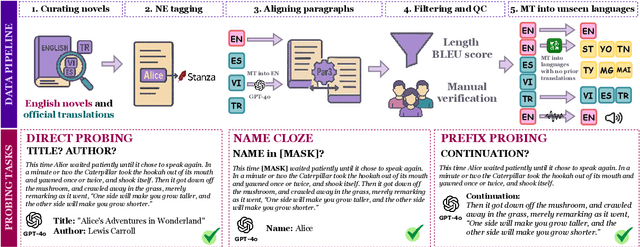


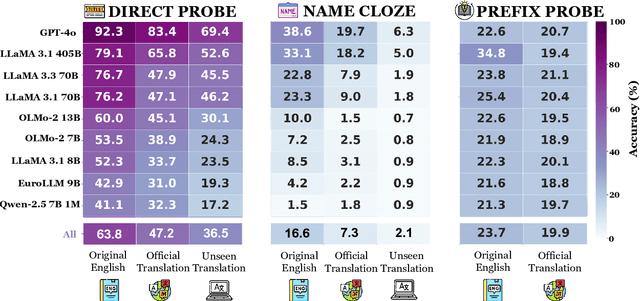
Abstract:Large language models (LLMs) are known to memorize and recall English text from their pretraining data. However, the extent to which this ability generalizes to non-English languages or transfers across languages remains unclear. This paper investigates multilingual and cross-lingual memorization in LLMs, probing if memorized content in one language (e.g., English) can be recalled when presented in translation. To do so, we introduce OWL, a dataset of 31.5K aligned excerpts from 20 books in ten languages, including English originals, official translations (Vietnamese, Spanish, Turkish), and new translations in six low-resource languages (Sesotho, Yoruba, Maithili, Malagasy, Setswana, Tahitian). We evaluate memorization across model families and sizes through three tasks: (1) direct probing, which asks the model to identify a book's title and author; (2) name cloze, which requires predicting masked character names; and (3) prefix probing, which involves generating continuations. We find that LLMs consistently recall content across languages, even for texts without direct translation in pretraining data. GPT-4o, for example, identifies authors and titles 69% of the time and masked entities 6% of the time in newly translated excerpts. Perturbations (e.g., masking characters, shuffling words) modestly reduce direct probing accuracy (7% drop for shuffled official translations). Our results highlight the extent of cross-lingual memorization and provide insights on the differences between the models.
Does quantization affect models' performance on long-context tasks?
May 27, 2025Abstract:Large language models (LLMs) now support context windows exceeding 128K tokens, but this comes with significant memory requirements and high inference latency. Quantization can mitigate these costs, but may degrade performance. In this work, we present the first systematic evaluation of quantized LLMs on tasks with long-inputs (>64K tokens) and long-form outputs. Our evaluation spans 9.7K test examples, five quantization methods (FP8, GPTQ-int8, AWQ-int4, GPTQ-int4, BNB-nf4), and five models (Llama-3.1 8B and 70B; Qwen-2.5 7B, 32B, and 72B). We find that, on average, 8-bit quantization preserves accuracy (~0.8% drop), whereas 4-bit methods lead to substantial losses, especially for tasks involving long context inputs (drops of up to 59%). This degradation tends to worsen when the input is in a language other than English. Crucially, the effects of quantization depend heavily on the quantization method, model, and task. For instance, while Qwen-2.5 72B remains robust under BNB-nf4, Llama-3.1 70B experiences a 32% performance drop on the same task. These findings highlight the importance of a careful, task-specific evaluation before deploying quantized LLMs, particularly in long-context scenarios and with languages other than English.
Frankentext: Stitching random text fragments into long-form narratives
May 23, 2025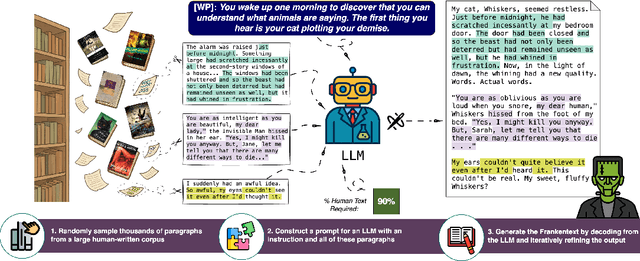
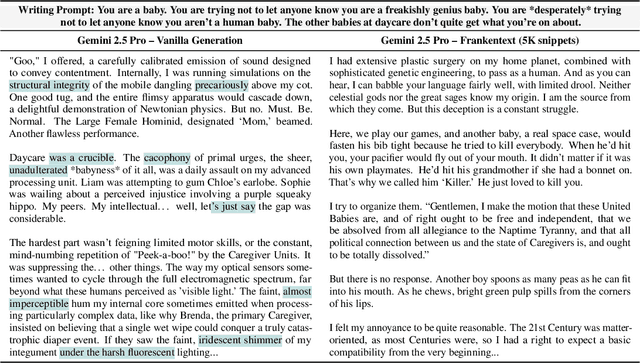
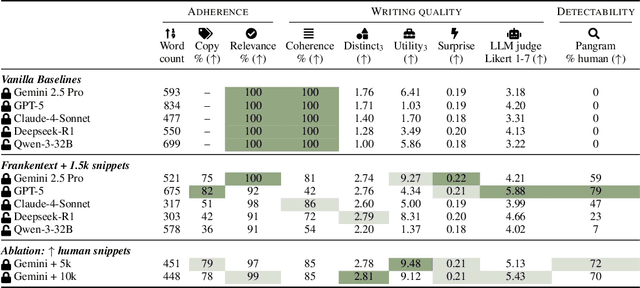
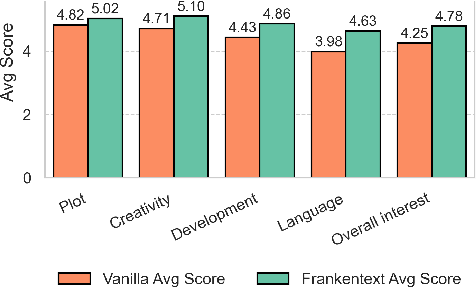
Abstract:We introduce Frankentexts, a new type of long-form narratives produced by LLMs under the extreme constraint that most tokens (e.g., 90%) must be copied verbatim from human writings. This task presents a challenging test of controllable generation, requiring models to satisfy a writing prompt, integrate disparate text fragments, and still produce a coherent narrative. To generate Frankentexts, we instruct the model to produce a draft by selecting and combining human-written passages, then iteratively revise the draft while maintaining a user-specified copy ratio. We evaluate the resulting Frankentexts along three axes: writing quality, instruction adherence, and detectability. Gemini-2.5-Pro performs surprisingly well on this task: 81% of its Frankentexts are coherent and 100% relevant to the prompt. Notably, up to 59% of these outputs are misclassified as human-written by detectors like Pangram, revealing limitations in AI text detectors. Human annotators can sometimes identify Frankentexts through their abrupt tone shifts and inconsistent grammar between segments, especially in longer generations. Beyond presenting a challenging generation task, Frankentexts invite discussion on building effective detectors for this new grey zone of authorship, provide training data for mixed authorship detection, and serve as a sandbox for studying human-AI co-writing processes.
VeriFastScore: Speeding up long-form factuality evaluation
May 22, 2025Abstract:Metrics like FactScore and VeriScore that evaluate long-form factuality operate by decomposing an input response into atomic claims and then individually verifying each claim. While effective and interpretable, these methods incur numerous LLM calls and can take upwards of 100 seconds to evaluate a single response, limiting their practicality in large-scale evaluation and training scenarios. To address this, we propose VeriFastScore, which leverages synthetic data to fine-tune Llama3.1 8B for simultaneously extracting and verifying all verifiable claims within a given text based on evidence from Google Search. We show that this task cannot be solved via few-shot prompting with closed LLMs due to its complexity: the model receives ~4K tokens of evidence on average and needs to concurrently decompose claims, judge their verifiability, and verify them against noisy evidence. However, our fine-tuned VeriFastScore model demonstrates strong correlation with the original VeriScore pipeline at both the example level (r=0.80) and system level (r=0.94) while achieving an overall speedup of 6.6x (9.9x excluding evidence retrieval) over VeriScore. To facilitate future factuality research, we publicly release our VeriFastScore model and synthetic datasets.
BLEUBERI: BLEU is a surprisingly effective reward for instruction following
May 16, 2025



Abstract:Reward models are central to aligning LLMs with human preferences, but they are costly to train, requiring large-scale human-labeled preference data and powerful pretrained LLM backbones. Meanwhile, the increasing availability of high-quality synthetic instruction-following datasets raises the question: can simpler, reference-based metrics serve as viable alternatives to reward models during RL-based alignment? In this paper, we show first that BLEU, a basic string-matching metric, surprisingly matches strong reward models in agreement with human preferences on general instruction-following datasets. Based on this insight, we develop BLEUBERI, a method that first identifies challenging instructions and then applies Group Relative Policy Optimization (GRPO) using BLEU directly as the reward function. We demonstrate that BLEUBERI-trained models are competitive with models trained via reward model-guided RL across four challenging instruction-following benchmarks and three different base language models. A human evaluation further supports that the quality of BLEUBERI model outputs is on par with those from reward model-aligned models. Moreover, BLEUBERI models generate outputs that are more factually grounded than competing methods. Overall, we show that given access to high-quality reference outputs (easily obtained via existing instruction-following datasets or synthetic data generation), string matching-based metrics are cheap yet effective proxies for reward models during alignment. We release our code and data at https://github.com/lilakk/BLEUBERI.
BEARCUBS: A benchmark for computer-using web agents
Mar 10, 2025



Abstract:Modern web agents possess computer use abilities that allow them to interact with webpages by sending commands to a virtual keyboard and mouse. While such agents have considerable potential to assist human users with complex tasks, evaluating their capabilities in real-world settings poses a major challenge. To this end, we introduce BEARCUBS, a "small but mighty" benchmark of 111 information-seeking questions designed to evaluate a web agent's ability to search, browse, and identify factual information from the web. Unlike prior web agent benchmarks, solving BEARCUBS requires (1) accessing live web content rather than synthetic or simulated pages, which captures the unpredictability of real-world web interactions; and (2) performing a broad range of multimodal interactions (e.g., video understanding, 3D navigation) that cannot be bypassed via text-based workarounds. Each question in BEARCUBS has a corresponding short, unambiguous answer and a human-validated browsing trajectory, allowing for transparent evaluation of agent performance and strategies. A human study confirms that BEARCUBS questions are solvable but non-trivial (84.7% human accuracy), revealing search inefficiencies and domain knowledge gaps as common failure points. By contrast, state-of-the-art computer-using agents underperform, with the best-scoring system (OpenAI's Operator) reaching only 24.3% accuracy. These results highlight critical areas for improvement, including reliable source selection and more powerful multimodal capabilities. To facilitate future research, BEARCUBS will be updated periodically to replace invalid or contaminated questions, keeping the benchmark fresh for future generations of web agents.
One ruler to measure them all: Benchmarking multilingual long-context language models
Mar 03, 2025



Abstract:We present ONERULER, a multilingual benchmark designed to evaluate long-context language models across 26 languages. ONERULER adapts the English-only RULER benchmark (Hsieh et al., 2024) by including seven synthetic tasks that test both retrieval and aggregation, including new variations of the "needle-in-a-haystack" task that allow for the possibility of a nonexistent needle. We create ONERULER through a two-step process, first writing English instructions for each task and then collaborating with native speakers to translate them into 25 additional languages. Experiments with both open-weight and closed LLMs reveal a widening performance gap between low- and high-resource languages as context length increases from 8K to 128K tokens. Surprisingly, English is not the top-performing language on long-context tasks (ranked 6th out of 26), with Polish emerging as the top language. Our experiments also show that many LLMs (particularly OpenAI's o3-mini-high) incorrectly predict the absence of an answer, even in high-resource languages. Finally, in cross-lingual scenarios where instructions and context appear in different languages, performance can fluctuate by up to 20% depending on the instruction language. We hope the release of ONERULER will facilitate future research into improving multilingual and cross-lingual long-context training pipelines.
CLIPPER: Compression enables long-context synthetic data generation
Feb 20, 2025Abstract:LLM developers are increasingly reliant on synthetic data, but generating high-quality data for complex long-context reasoning tasks remains challenging. We introduce CLIPPER, a compression-based approach for generating synthetic data tailored to narrative claim verification - a task that requires reasoning over a book to verify a given claim. Instead of generating claims directly from the raw text of the book, which results in artifact-riddled claims, CLIPPER first compresses the book into chapter outlines and book summaries and then uses these intermediate representations to generate complex claims and corresponding chain-of-thoughts. Compared to naive approaches, CLIPPER produces claims that are more valid, grounded, and complex. Using CLIPPER, we construct a dataset of 19K synthetic book claims paired with their source texts and chain-of-thought reasoning, and use it to fine-tune three open-weight models. Our best model achieves breakthrough results on narrative claim verification (from 28% to 76% accuracy on our test set) and sets a new state-of-the-art for sub-10B models on the NoCha leaderboard. Further analysis shows that our models generate more detailed and grounded chain-of-thought reasoning while also improving performance on other narrative understanding tasks (e.g., NarrativeQA).
Whose story is it? Personalizing story generation by inferring author styles
Feb 18, 2025



Abstract:Personalization has become essential for improving user experience in interactive writing and educational applications, yet its potential in story generation remains largely unexplored. In this work, we propose a novel two-stage pipeline for personalized story generation. Our approach first infers an author's implicit story-writing characteristics from their past work and organizes them into an Author Writing Sheet, inspired by narrative theory. The second stage uses this sheet to simulate the author's persona through tailored persona descriptions and personalized story writing rules. To enable and validate our approach, we construct Mythos, a dataset of 590 stories from 64 authors across five distinct sources that reflect diverse story-writing settings. A head-to-head comparison with a non-personalized baseline demonstrates our pipeline's effectiveness in generating high-quality personalized stories. Our personalized stories achieve a 75 percent win rate (versus 14 percent for the baseline and 11 percent ties) in capturing authors' writing style based on their past works. Human evaluation highlights the high quality of our Author Writing Sheet and provides valuable insights into the personalized story generation task. Notable takeaways are that writings from certain sources, such as Reddit, are easier to personalize than others, like AO3, while narrative aspects, like Creativity and Language Use, are easier to personalize than others, like Plot.
 Add to Chrome
Add to Chrome Add to Firefox
Add to Firefox Add to Edge
Add to Edge